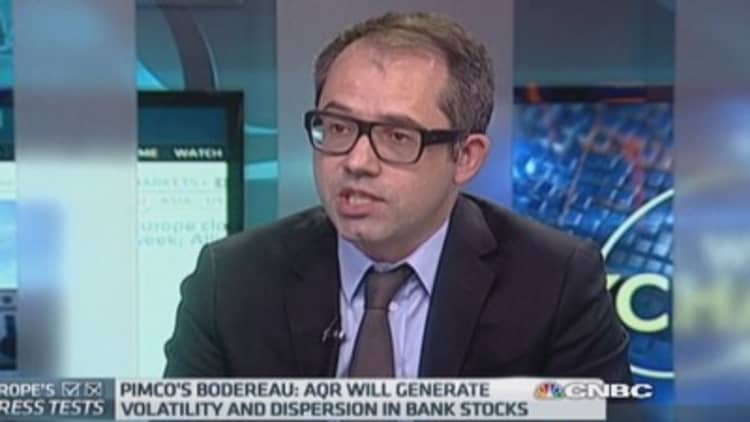Even before they are published on Sunday, speculation over who is going to pass or fail the European bank stress tests and criticism of the healthcheck of the region's banking sector has reached fever pitch.
European banking shares edged lower on Friday, with traders citing a reports that 25 banks within the euro zone would fail a European Central Bank "stress test".
The European Banking Authority has been testing 123 banks in the European Union – the 18-member euro zone and the 10 non-euro countries -- measuring how well lenders can weather differing degrees of economic downturn. The EBA tests are checked by the ECB in the case of euro zone banks, or the country's own central bank when it is outside the euro zone.
Simultaneously the ECB has been focusing on the quality of 130 banks' assets.
On Sunday, the two sets of results – the ECB's Asset Quality Review (AQR) and the EBA stress tests – will be released as a Comprehensive Assessment (CA).
One hundred and five banks would pass the ECB's review, according to reports. Of the lenders that failed, about 11 or 12 will still face capital shortfalls they need to plug.
Asked to comment on the report, the ECB said: "The ECB can't comment on individual institutions or speculation. Any inferences drawn as to the final outcome of the exercise would be highly speculative until the results are final on the 26 October."
Comprehensive review?
The EBA stress tests involve running banks' books through shocks like a 14 percent drop in house prices from current predictions. However, they do not involve deflation, or a sustained period with higher or lower prices for commodities such as oil – both of which the euro zone is potentially facing.
There is also disagreement over how certain assets may be classed. In weaker economies like Portugal, Greece, Spain and Italy, the governments have passed laws allowing banks to convert deferred tax assets (DTAs), which are tax payment deferrals generally awarded during times of weaker profitability, into more capital-enhancing deferred tax credits (DTCs).
Read More European bank stress tests: Your guide

The ECB, which will take over as the euro zone's banking supervisor next year, is believed to disapprove of such moves as they may expose taxpayers to more risk if the banks have to be bailed out further down the line.
There have also been plenty of calls on which banks are likely to struggle to make the grade.
These can seem a little motivated by national bias rather than analysis – there haven't been very many Germany-based banking analysts predicting failures at Germany's regional Landesbanken, some of which other have argued are likely failures, for example.
"The massive caveat for all predictions is: we don't have the data that the ECB and EBA do," Oliver Burrows, senior analyst at Rabobank, told CNBC.
"It's an exercise of the ECB getting comfortable with these institutions," Roberto Henriques, head of financials credit research at JPMorgan, told CNBC.
Read More ECB cools speculation over bank health checks ahead of results: Source
"European banks have actually done quite a lot in terms of balance sheet repair and capital raising. To give it additional credibility, you need to have some victims, and those are going to be quite predictable."
Another fear is that if there is a rush of these weaker "victims" to raise more capital, there may not be much demand for it – and that could weaken the sector further.
"Who would want to support or buy new equity in these banks?" Burrows asked.
- By CNBC's Catherine Boyle


